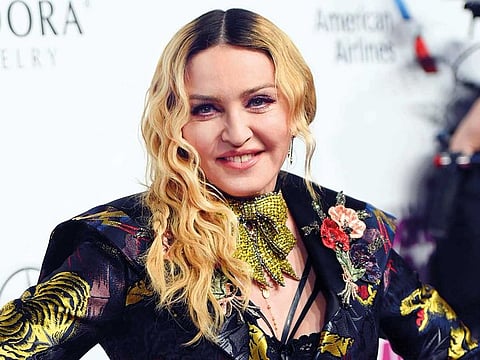Madonna trashes magazine profile, says she feels ‘raped’
Superstar says writer Vanessa Grigoriadis failed to champion other women

Madonna ripped the New York Times last week after a new magazine profile that focuses a lot on her age made her “feel raped,” saying that it’s further proof that the newspaper “is one of the founding fathers of the Patriarchy.”
The superstar began her tirade against contributor Vanessa Grigoriadis, who has previously written for the New York Times Magazine and Vanity Fair. Madame X said Grigoriadis failed to champion other women because her in-depth feature, titled ‘Madonna at Sixty,’ focused on “trivial and superficial matters” that she thinks never would have been mentioned if she was a man.
“To say that I was disappointed in the article would be an understatement,” the Grammy winner wrote on Instagram. “It seems you can’t fix society and its endless need to diminish, Disparage or degrade that which they know is good. Especially strong independent women.”
The profile is an all-access retrospective of the iconic entertainer’s career that tries to make sense of Madonna’s place in the evolving music industry. It takes readers into the chameleonic star’s London home, backstage at May’s Billboard Music Awards and at the GLAAD Media Awards in New York.
It also laments the pre-streaming music landscape and criticises the “younger generation,” but also praises the pop icon’s endurance and reveals secrets behind Madonna’s active participation on social media.
That Madge’s tirade was posted on Instagram echoes Grigoriadis’ theory that the singer has acted “like a cactus with spikes protecting her from anyone getting too close, particularly journalists.” Madonna’s displeasure with the story is the latest in a larger journalistic conversation about the utility of the celebrity profile.
But Madonna chose to highlight what she believes were the author’s own gender biases.
“Women have a really hard time being the champions of other women even if they are posing as intellectual feminists” she wrote. “I’m sorry I spent 5 minutes with her. It makes me feel raped. And yes I’m allowed to use that analogy having been raped at the age of 19.
“Further proof that the venerable NYT is one of the founding fathers of the patriarchy,” she went on. “And I say — DEATH TO THE PATRIARCHY woven deep into the fabric of society. I will never stop fighting to eradicate it. “
It’s worth nothing that Grigoriadis criticised the singer’s metaphorical use of the phrase “I felt raped” in the piece when Madonna characterised her deep disappointment over the leak of her 2015 album, ‘Rebel Heart,’ in those same terms.
Age concerns
Madonna’s irritation could be felt throughout the lengthy profile and at one point she tells Grigoriadis, a self-proclaimed fan who began listening to her music at age 11, that she thinks “about growing old too much”.
“Stop thinking, just live your life and don’t be influenced by society trying to make you feel some type of way about your age or what it is you’re supposed to be doing,” Madonna said in the piece. “We are a marginalised group, women. And just because it’s hard doesn’t mean you stop fighting against it or defying it or refusing to be pigeonholed or put in a box or labelled or told you can and can’t do things.”
This isn’t the first time Grigoriadis has inflamed one of her subjects. In a 2015 profile, also for the New York Times Magazine, rap star Nicki Minaj was so incensed at Grigoriadis’ questions that she abruptly ended an interview by booting the journalist out of her hotel room.
Neither Grigoriadis nor the New York Times have commented on the Madonna flap, and the newspaper declined to comment when reached by The Times on Friday. However, Styles section editor Choire Sicha acknowledged in a newsletter that “Madonna absolutely despises this profile.”
“[T]hough I’m unclear on why,” Sicha wrote. “It’s often awful to be written about! It’s a very normal reaction, and I think it’s amplified for people who are very regimented and used to being in control of their lives.”



